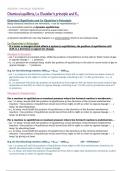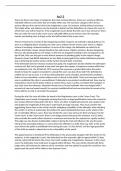Chemical equilibria, Le Chatelier’s principle and Kc
Chemical Equilibria and Le Chatelier’s Principle
Many chemical reactions are reversible, + can be represented by ⇌
In a reversible reaction at dynamic equilibrium:
• forward + reverse reactions proceed at equal rates and…
• the concentrations of reactants + products remain constant.
A dynamic equilibrium can only happen in a closed system which is at constant temp.
Le Chatelier’s Principle
✴ If a factor is changed which affects a system in equilibrium, the position of equilibrium will
shift in a direction to oppose the change.
Changes in Pressure
• An ↑ in pressure at constant temp. shifts the position of equilibrium to the side w/ fewer moles of gas
to oppose change + ∴ ↓ pressure.
• A ↓ in pressure at constant temp. shifts the position of equilibrium to the side w/ more moles of gas to
oppose change + ∴ ↑ pressure.
E.g. for the following reaction: 2SO2(g) + O2(g) ⇌ 2SO3(g)
• An ↑ in pressure will shift the position of equilibrium from left to right (as there are fewer moles of
gas molecules on the right) in order to oppose change, resulting in an ↑ in SO3 production + a ↓ in
pressure.
• A ↓ in pressure will shift the position of equilibrium from right to left (as there are more moles of gas
molecules on the left) in order to oppose change, resulting in an ↑ in SO2 and O2 production and an ↑
in pressure.
Changes in Temperature
For a reaction in equilibrium at constant pressure where the forward reaction is exothermic…
• an ↑ in temp. would shift the position of equilibrium in the direction of the reverse endothermic
reaction + the position of equilibrium would move from right to left in order to oppose change + ∴ ↓
temp. by absorbing heat.
• a ↓ in temp. would shift the position of equilibrium in the direction of the forward exothermic
reaction + the position of equilibrium would move from left to right in order to oppose change + ∴ ↑
temp. by giving out heat.
For a reaction in equilibrium at constant pressure where the forward reaction is endothermic…
• an ↑ in temp. would shift the position of equilibrium in the direction of the forward endothermic
reaction + the position of equilibrium would move from left to right in order to oppose change + ∴ ↓
temp. by absorbing heat.
• a ↓ in temp. would shift the position of equilibrium in the direction of the reverse exothermic
reaction + the position of equilibrium would move from right to left in order to oppose change + ∴ ↑
temp. by giving out heat.
E.g. for the following reaction: 2SO2(g) + O2(g) ⇌ 2SO3(g) ∆H = -197kJmol-1
• An ↑ in temp.will shift the position of equilibrium from right to left (the endothermic direction) to
absorb the extra heat in order to oppose change.
• A ↓ in temp. will shift the position of equilibrium from left to right (the exothermic direction) to give
out more heat in order to oppose change.







